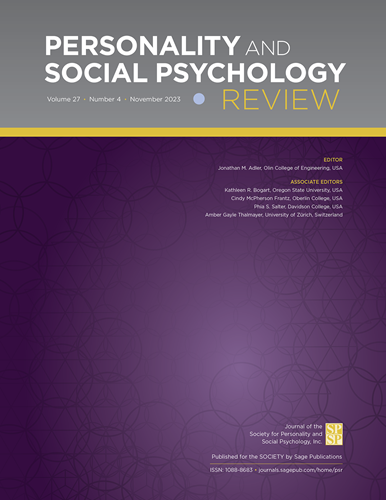Second Thoughts About Culture and Cause: Why and How Do the Chinese and Americans Differ in Causal Attributions?
IF 10.4
1区 心理学
Q1 PSYCHOLOGY, SOCIAL
引用次数: 0
Abstract
Academic AbstractCurrent theories on dispositional-situational attributions suggest that East Asians' attributions are more external compared to Westerners. However, empirical studies yield mixed findings. I reflect on historical, philosophical, and sociological resources in China and the United States to address this inconsistency. This paper (a) proposes a new attributional dimension borrowed from Chinese philosophy-human- versus heaven-determined (-); (b) postulates that the Chinese are more likely to make internal human-determined attributions than Americans, whereas Americans are more inclined to make internal and external heaven-determined attributions than the Chinese; (c) reviews the existing literature to examine the extent to which this theory is evidenced and determine aspects remaining untested; and (d) discusses the generalizability to other cultures and directions for further research. Notably, "heaven-determined" is interpreted metaphorically (not religiously). Beyond dispositional-situational theory, this paper spotlights another meaningful pathway for constructing cross-cultural theory: The Chinese emphasize human determinism more than Americans.Public AbstractWhy do I succeed or fail? Why do people help or harm others? Members of different cultures may provide different answers to such questions-known in psychology as "causal attributions." A popular belief in psychology is that East Asians are more likely than Westerners to consider external factors-in other words, environmental/outside factors-as causes of behaviors and outcomes. In this paper, I challenge this prevailing theory and propose an alternative, drawing on cultural resources and social realities of China and the United States. When explaining why something happens, the Chinese may focus more on average than Americans do on internal causes determined by humans (e.g., effort, motivation, attitude, skill, and strategy), whereas Americans may focus more on average than the Chinese do on causes that are not determined by humans (e.g., aptitude, genes, gender, race/ethnicity, physiological characteristics, luck, and supernatural force). More research is needed to test this postulation.对文化与原因的再思考:中美两国在因果归因上的差异为何及如何?
学术摘要当前的倾向-情境归因理论认为,东亚人的归因比西方人更具有外部性。然而,实证研究得出了不同的结果。我反思了中国和美国的历史、哲学和社会学资源,以解决这种不一致。本文(1)借鉴中国哲学,提出了一个新的归因维度——人定与天定;(b)假设中国人比美国人更倾向于人的内在归因,而美国人比中国人更倾向于人的内在归因和天的外在归因;(c)回顾现有文献,以检验该理论被证明的程度,并确定尚未经过检验的方面;(d)讨论了对其他文化的普遍性和进一步研究的方向。值得注意的是,“上天决定”是隐喻性的解释(而不是宗教上的)。除了倾向-情境理论,本文还指出了构建跨文化理论的另一个有意义的途径:中国人比美国人更强调人的决定论。我为什么会成功或失败?为什么人们会帮助或伤害他人?不同文化背景的人可能会对这些问题给出不同的答案——心理学上称之为“因果归因”。心理学中一个流行的观点是,东亚人比西方人更倾向于考虑外部因素——换句话说,环境/外部因素——作为行为和结果的原因。在本文中,我对这一主流理论提出了挑战,并根据中美两国的文化资源和社会现实提出了另一种选择。在解释某件事发生的原因时,中国人可能比美国人平均更关注由人类决定的内因(例如,努力、动机、态度、技能和策略),而美国人可能比中国人平均更关注非人类决定的原因(例如,天赋、基因、性别、种族/民族、生理特征、运气和超自然力量)。需要更多的研究来验证这一假设。
本文章由计算机程序翻译,如有差异,请以英文原文为准。
求助全文
约1分钟内获得全文
求助全文
来源期刊

Personality and Social Psychology Review
PSYCHOLOGY, SOCIAL-
CiteScore
19.00
自引率
1.90%
发文量
20
期刊介绍:
Title: Personality and Social Psychology Review (PSPR)
Journal Overview:
Official journal of SPSP, the Society for Personality and Social Psychology, Inc.
Premiere outlet for original theoretical papers and conceptual review articles in all areas of personality and social psychology
Features stimulating conceptual pieces identifying new research directions and comprehensive review papers providing integrative frameworks for existing theory and research programs
Topics Covered:
Attitudes and Social Cognition: Examines the inner workings of the human mind in understanding, evaluating, and responding to the social environment
Interpersonal and Group Processes: Explores patterns of interaction and interdependence characterizing everyday human functioning
Intergroup Relations: Investigates determinants of prejudice, conflict, cooperation, and harmonious relationships between social groups
Personality and Individual Differences: Focuses on causes, assessment, structures, and processes giving rise to human variation
Biological and Cultural Influences: Studies the biological and cultural mediation of social psychological and personality processes
 求助内容:
求助内容: 应助结果提醒方式:
应助结果提醒方式:


